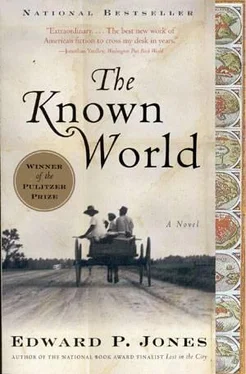“Yes, well, I have a feeling that he’ll like the challenge of the people in Pennsylvania,” Winifred said. “If you present your case in just the right way, they’ll accept.”
“Like you did with me.”
She laughed and raised her head and looked at him. “I would say, Mr. Skiffington, that it was the reverse of that. I was standing in one spot and you walked over to me. I wasn’t raised to live any other way.”
He said nothing.
“And Minerva?” Winifred said.
“She would come, too, that is if she isn’t grown and off on her own when we leave.” He could see Minerva, out in the back of their house, near the chicken coop, reaching up to pick apples, the ones not quite ripe and so best for a pie. “We can make a way for her in Pennsylvania. And if she is grown, then there will be nothing to talk about. It will be her life to do with as she pleases.”
“I want her up there with me as well,” Winifred said. “I would hate to be home without her. I want everybody I love up there, like in a big garden where we wouldn’t want for anything.”
“I think Adam and Eve might have taken that from us,” Skiffington said. “And Pennsylvania may be as far from Eden as we can get.”
“Pooh.”
“We’ll make our own way. I give you my word.”
“Then I take the pooh back.” She held her hand out before her. “Come back pooh.” She opened her hand and then put it to her open mouth and clamped her mouth shut. “There, pooh is back.” A little farther on she yawned and closed her eyes with her head against his shoulder. He went back to singing. Soon she was asleep but he went on singing anyway, just a mite softer than before.
Minerva was waiting at the gate when they pulled up. She waved and they waved to her. She was almost as tall as Winifred. This was before Skiffington began to think of her in a different way.
”Father Skiffington went to the jail to feed that man,” Minerva said. Carl Skiffington, John’s father, was not above working on Sunday, and besides, he said, feeding a prisoner was a necessity, not a task that could be put off until Monday. Minerva sailed up the front steps of the house and wrapped her arms around the post. She turned and opened the door and the three went in.
She, Minerva, was not a servant in the way the slaves all about her were, for they did not believe they owned her. She did serve, charged with cleaning the house, sharing the job of cooking the meals with Winifred. But they would not have called her a servant. Had she been able to walk away from them, knew north from south and east from west, Skiffington and Winifred would have gone after her, but it would not have been the way he and his patrollers would pursue an escaped slave. A child would have been lost and so parents do what must be done.
The world did not allow them to think “daughter,” though Winifred was to say years later in Philadelphia that she was her daughter. “I must have my daughter back,” she said to the printer making up the posters with Minerva’s picture on them. “I must have my daughter back.”
So she was a daughter and yet not a daughter. She was Minerva. Simply their Minerva. “Minerva, come here.” “Minerva, how does this taste?” “Minerva, I’ll get the cloth for your dress when I come home from the jail.” “Minerva, what would I do without you?” To the white people in Manchester County, she was a kind of pet. “That’s the sheriff’s Minerva.” “That’s Mrs. Skiffington’s Minerva.” And everyone was happy with all of it. As for Minerva, she had known nothing else. “You done growed,” Minerva’s sister was to say years later in Philadelphia.
John Skiffington got to the jail about eight that Monday morning.
“Ah ah, good morning, Monsieur Sheriff,” Jean Broussard said as soon as Skiffington came in the door. “I have missed all of your company, though I must say your père is a charming and most adequate substitute. He says all the time that God is with me, but that is something I knew long ago. God is everywhere in America, especially here with me.”
”Broussard, good morning.”
“I do not want to rush the way the world goes, but I am beginning to think I will not be walking free before I am as old as your père .”
“You say you are innocent, and if that is true, the law will see it and set you free.”
“I am innocent. I am innocent, Monsieur Sheriff.” Broussard had claimed all along that he had been defending himself when he killed his partner, a man from Finland or Norway or Sweden, depending upon the mood the partner was in when he was asked where he was from. When the partner was in a foul mood, he said he was from Sweden. He was Swedish the day he died.
“So much depends on when the circuit judge gets here to try your case,” Skiffington said, hanging his coat on a rack near the door. Broussard’s coat was the only other thing hanging, and it had been hanging there for two weeks. “He gets here, the jury hears you and the whole world belongs to you again. France and any place else you want to go.” Skiffington went to his desk and sat, started looking for paper to petition, once more, for the circuit judge to come. The town had not had a need for a judge since a white man a year before was charged with wounding his wife. He was acquitted after the wife, a dressmaker and Robert Colfax’s lover, testified that she had somehow shot herself in the back.
“Perhaps not France anymore. I love France. France gave me birth, but I am America now, Monsieur Sheriff. I raise the flag! I raise the flag high over my head and over all your heads, Monsieur Sheriff!”
“Good for you, Broussard. Good for all of us.” A man from Culpeper had agreed to come down and defend him. Skiffington found a piece of paper for the petition, and in another drawer he found the list of questions that needed to be answered on the blank paper before someone in Richmond would say the judge could come. Each question had to be written down on the petition paper, followed by the answer. And each question from the list had to be written down even if there was no answer to it. Nature of the Alleged Crime .
“I am thinking that I will stay forever to live here, stay in this place and be happy.” Broussard had been a citizen of the United States for three years. He had not seen France and his family since he left them eight years ago. He still planned to bring his family to America. Only his two oldest children even remembered what Broussard looked like. “Stay and pursue the happiness, heh, as be always the right of you and me.” Broussard’s wife had taken a lover two years after he left. The wife and every last one of Broussard’s children were in love with the lover. It was a love from which Broussard would not have been able to retrieve them. “I sing America. I sing America happiness.”
“Yes,” Skiffington said, opening the ink jar, “pursue it to your heart’s content.” Name of Alleged Victim or Victims.
“I will bring my wife here and we will be strong like you and the Mrs. Skiffington. I will be Mr. Broussard and we will be Mr. and Mrs. Broussard. Have a house bigger than yours, Monsieur Sheriff. Do you have a big house, Monsieur Sheriff?” Broussard and his partner, Alm Jorgensen, had come to Manchester with two slaves to sell-Moses, the man who would become Henry Townsend’s overseer, and a woman named Bessie. They had heard that Robert Colfax was looking for new slaves, but Colfax was not satisfied with how Broussard and Jorgensen had come about the slaves. “We got the people in Alexandria, goddamn the world,” Jorgensen kept telling Colfax. He also told Colfax he was Finnish. But they had no bills of sale for Moses and Bessie, and because Broussard and Jorgensen were strangers, and foreigners to boot, Colfax sent them away.
Читать дальше












